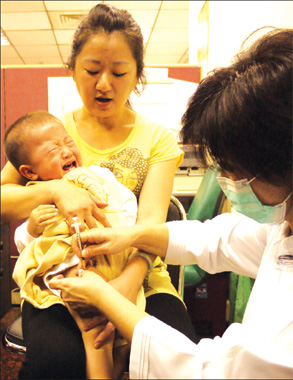Babies have H1N1 flu shot priority, multi-shot option
Updated: 2009-11-10 08:58
(HK Edition)
|
|||||||||
|
A mother has her baby vaccinated against the A(H1N1) influenza, also known as swine flu, at a hospital in Taipei yesterday. CNA |
TAIPEI: Swine flu shots became available yesterday for babies aged between six months and one year, while a health official said that babies can get vaccinated for both H1N1 and seasonal flu at the same time.
Lin Ting, deputy director-general of the Centers for Disease Control (CDC) said the number of babies eligible for the vaccinations has been estimated at between 100,000 and 150,000, with the shots available at 548 locations around the island, such as local county or city health departments and district health centers.
For the two-dose H1N1 vaccination, babies need to receive the shots a month apart, he added.
He also stressed that babies allergic to eggs should not be given the shots as they could trigger an allergic reaction.
Typhoon Morakot-affected people and health care personnel were earlier given top priority by the government for A(H1N1) vaccinations and have been receiving the shots since the beginning of November.
Next on the list after infants under one year of age are pre-school children aged one and over, seriously-ill patients and elementary school students, who are scheduled to receive the shots from November 16.
Others on the priority list are junior and senior high school students, individuals in the 19-24 age bracket and those over 25 at high risk of cardiopulmonary disease, healthy people in the 25-49 age bracket, and people between 50 and 64 years old, in that order.
Public reaction to the free vaccinations was varied in different parts of Taiwan. In Taipei, many parents with babies began lining up at district health centers early yesterday for the shots.
The same occurred in southern Taiwan's Chiayi City, despite the city health bureau's assurances that parents need not worry about insufficient doses of H1N1 vaccine.
However, in southern Taiwan's Kaohsiung City, where 8,000 babies are eligible, uptake was small.
China Daily/CNA
(HK Edition 11/10/2009 page2)
